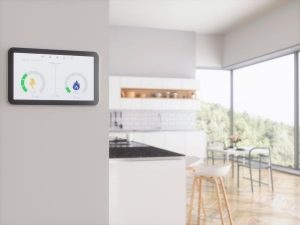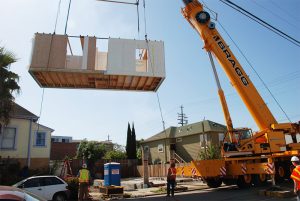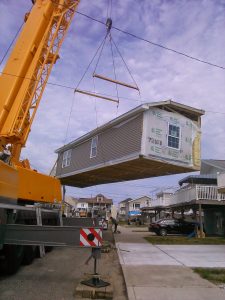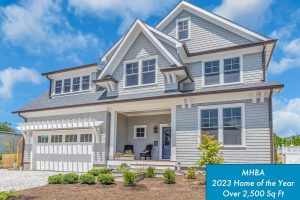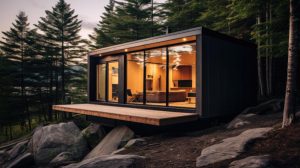
So you are in the market for a new home and heard that a modular home might be a less expensive option? Given that modular homes are built with the same materials and built to the same codes as conventional site built homes it would seem that the costs would also be the same. Generally speaking, the costs are comparable, but there are a few ways that a modular home can save you money.
Construction Loan – During the construction phase of your home, typically you will have a construction loan. Payments (or draws) are taken from this loan to pay contractors, subcontractors and materials, with the borrower (home owner) paying the monthly interest payment. Once construction is completed, the construction loan will be paid off with your permanent mortgage loan. One of the key advantages of modular construction is the shorter construction schedule. Construction of your home is occurring at the same time as the foundation work. When the foundation is completed, it is generally only a matter of weeks before your home is set. It is not uncommon for a modular home to be completed two to three months sooner than a comparable site built home, saving you the interest payments for those months. The amount you save here depends on the principal amount, the interest rate and the draw schedule. For illustrative purposes, the monthly interest payment on a $200,000 loan at 5% is $833.33.
Materials/Waste - The U.S. Environmental Protection Agency estimated that a staggering 164 million tons of building-related waste was generated annually in the United States. According to the National Association of Home Builders (NAHB) construction of a typical 2,000-square-foot home generally produces about 8,000 pounds of waste. That’s four tons of waste going to our landfills for every new homes built! A home built in a factory controlled setting yields far better results. NAHB’s study concluded that on average, 4 pounds of waste is generated per square foot of new home construction (4lbs/sf). The typical modular manufacturer generates about half a much waste during the construction process.
On a modular home site, you do not see the row of dumpsters filled with drywall, lumber, and excess building materials like you do on nearly every conventional site. Excess lumber on a modular home is either used for additional wall bracing while the home is being constructed in the factory, or stored and used for a future home. Additionally, it is much easier and cost effective for the modular manufacturer to separate and recycle items that often land in the same dumpster on site. As a result, the hard costs of waste disposal are reduced.
Waste Disposal Costs: This might equate to $300-$400 on a 2,000 square foot home. But there is also the upfront cost purchasing the material that was wasted. It is not at all uncommon for site built contractors to order a little extra for all materials delivered to the site. Why? Because they don’t want to run short and have to stop the project and go order more.
Materials Cost: While material waste depends largely on which materials we are talking about, we will use a “waste” figure of 10%, meaning 10% of the materials you pay for do not end up in your home with a conventional builder. That can be a significant amount when you consider as much as 25% of the total cost of your home is materials expense. This is a 2-2.5% savings on your total cost alone!
Let’s use that 2,000 square foot home as an example to show the savings:
Total home cost = $240,000
Construction loan = $200,000
Cost / sf = $120
Materials cost = $60,000
Materials waste cost = $6,000
Materials disposal cost = $400
Construction loan savings (2 months of interest) = $1,667
Total cost savings with modular = $8,067 = 3.4%
When you factor in workforce labor productivity (it takes fewer labor hours to construct a comparable size modular home), as well as overall energy efficiency of the modular home once occupied (due to higher quality control and tighter building envelop), it’s easy to see how a modular home can end up saving you 5-10% overall.
Obviously it is impossible to apply all of these assumptions to all modular homes, but this article does demonstrate the potential savings you can realize with your new modular home.
Learn More From MHBA
Latest Modular Design Trends
What are the latest modular design trends? What trends are on the horizon?
What’s in a Name? Modular, Manufactured, Prefab, Offsite?
What is the difference between modular homes, manufactured homes, prefab homes, and homes built offsite?
Ways a Modular Home Can Save You Money
Are modular homes cheaper than site built homes? Why are modular homes cheaper than site built homes?
Creating Affordable Energy-Efficient Housing Through Modular Building
It feels like everyone — consumers and contractors alike — is looking for ways to improve their homes’ energy efficiency. Thanks to climate change, dangerously hot summers and brutally cold winters make it more challenging to keep structure interiors comfortable.
Is Modular Housing the Solution to the Housing Crisis?
In 2007, the United States faced a housing crisis that caused the Great Recession and had economic ramifications for years. Some people called it the subprime mortgage crisis. One cause of the crisis is that lenders gave loans to potential homeowners even if the buyers couldn’t afford them.
More Than Ever, The Modular Future is Now
In 2007, the United States faced a housing crisis that caused the Great Recession and had economic ramifications for years. Some people called it the subprime mortgage crisis. One cause of the crisis is that lenders gave loans to potential homeowners even if the buyers couldn’t afford them.
2023 Home of the Year Winners Announced!
Announced at the MHBA 2023 Annual Conference & Housing Summit, we are happy to present the 2023 MHBA Modular Homes of the Year. The MHBA Annual Conference & Modular Housing Summit is the most comprehensive meeting anywhere for modular home builders, architects, engineers, developers, and suppliers. The Modular Home Builders Association provides professionals in residential modular construction a place to network, exchange ideas, learn from experts, discuss issues, and grow professionally.
Pros and Cons of Modular Homes
The pros of modular homes include lower costs over traditional construction methods, better quality, improved construction speed, and better resilience while the cons consist of a bit more complicated financing process, lack of customization, and the social stigma that is the consequence of the low-quality of modular homes in the past. In this article, we…
New Member Spotlight: BonnaVilla
New Member Spotlight: BonnaVilla The Modular Home Builders Association is pleased to welcome BonnaVilla, a division of Chief Industries, as our newest member. Based in Aurora, Nebraska, BonnaVilla has been a trusted modular home manufacturer since 1970, serving families and developers across the Midwest. A Legacy of Stability and Growth BonnaVilla began as a…
- « Previous
- 1
- 2
- 3
- 4
- Next »
